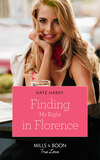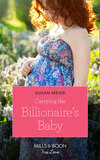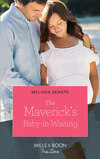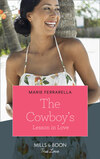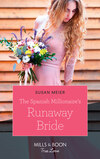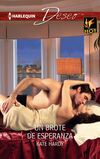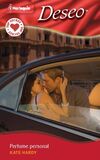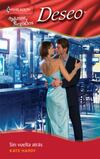Kitabı oku: «Finding Mr Right In Florence», sayfa 2
‘Noted. I’ll organise the baggage details. And if you can give my secretary your passport details,’ he said, ‘she’ll check you in on the flight.’
In some ways, this was surreal. But it was also the first time she’d felt properly enthusiastic about something since the court case. Maybe this would be the tipping point, the thing that finally helped her to move on and put the past completely behind her.
‘I’ll go home now and arrange it,’ she said.
‘Thank you, Miss Thackeray. I appreciate it.’ He held out his hand to shake hers.
Again, her skin actually tingled where it met his. She’d have to be very careful not to let her attraction to him get in the way. She knew what she was doing where work was concerned, but relationships were a very different matter. Something she really wasn’t good at.
‘May I borrow those photographs?’ she asked. ‘So I can talk to my producer.’
‘Of course.’
‘Thank you.’
* * *
On the way home, Mariana used her phone to snap the photographs, emailed the images to Nigel, and then called him.
‘I’m just out of the meeting and I’ve emailed you some photographs. Here’s the elevator pitch. Imagine the equivalent of a chateau full of lost paintings by Degas, Monet and Pisarro. And the owner wants me to catalogue them all and check out the provenance of some of them.’
‘No way,’ Nigel said. ‘No way is there a chateau full of lost French Impressionists.’
‘Equivalent,’ she reminded him. ‘It’s a palazzo in Florence, so we’re talking Italian rather than French Impressionists. It’s the Macchiaioli, the ones I’m studying. And I’m going to see the paintings tomorrow.’
‘What?’
‘Angelo Beresford wants me to authenticate the paintings—and the painting in that last shot I sent you is unsigned. If it’s what my gut tells me it is, then it’d be perfect for the show.’
‘If something sounds too good to be true, Mariana, it usually is.’
Yeah. She knew that one first-hand from the lovely, sweet, gentle man she thought she’d got engaged to—the man who’d turned out to be a control freak with a nasty temper behind the charm. The man who’d almost broken her. ‘It’s worth a look,’ she said. ‘Just think, Nigel. A whole collection. Art that hasn’t been seen for decades.’ Even the idea made her heart rate go up a few notches.
‘So, on the basis of a few photographs, you’re planning to go to Florence tomorrow with a stranger.’
‘A lawyer in a very respectable firm that has very posh offices in the city, and he checks out as genuine,’ she corrected.
‘But the man’s still a stranger.’
‘We’re working on the third series of the show now. How many lost paintings have we found so far?’ she asked.
‘Fourteen, and two where we couldn’t prove the provenance or get them accepted by the experts, but the detective side of the story made really good viewing,’ Nigel said. ‘Along with all the hundreds of people who’ve contacted us about fakes and copies.’
‘I think it’s worth following up,’ she said. ‘I haven’t had a holiday in a year and a half. Worst-case scenario, if it is too good to be true, then I’ll get a few days’ break in Florence. Best-case, if this is an eccentric collector and the paintings are genuine, they’ll fit in with my PhD and make a potential episode of Hidden Treasure—and I think it’ll be our best episode to date.’
‘You really want to do this, don’t you?’
She nodded. ‘I’ve got a funny feeling about it.’
‘More like you really want it to be true,’ Nigel said. ‘Like if someone told me they had what they thought was a lost Turner painting and we looked into it for Hidden Treasure and managed to find the provenance. I’d be thrilled.’
‘Exactly.’
Nigel sighed. ‘I’d be happier if someone went with you.’
Mariana knew what he was worrying about. ‘Eric isn’t going to come after me,’ she said. ‘There’s a restraining order in place.’
‘Which he broke last year.’
‘And he has a suspended sentence. He’s not going to risk spending at least two years in prison,’ Mariana said. ‘So I’m going to Florence. I’ll keep you posted.’
She was lucky, Mariana thought as she walked from the tube station to her flat. So very lucky.
Lucky that she had a family and friends who’d refused to give up on her when Eric had started to isolate her from everyone. Lucky that they’d seen through his charm when she hadn’t been able to—and then that they’d seen her failing self-esteem and bolstered her. Lucky that they’d got her into a refuge when things turned nasty and then helped her get a restraining order so he couldn’t come anywhere near her again.
Eric had lied in court. He’d said that she was making it all up. That she was a drama queen begging for attention and she might as well have been on one of those ‘court case’ reality TV shows rather than in a proper court of law.
But the court had seen the truth. That he’d systematically undermined her over the two years of their relationship, made her feel useless and worthless, and isolated her from her family and friends. And her lawyer had found one of his exes; Eric had treated Adele in exactly the same way, and she’d been willing to speak up in court.
The court had made the injunction with no reservations.
And how Eric must hate it that she’d gone on to be happy. That she’d finished her MA in History of Art and then landed the job presenting Hidden Treasure. That she was well on the way to becoming Dr Mariana Thackeray and people respected her for her knowledge.
He’d tried to bring her down when Hidden Treasure first started airing. He’d posted anonymous comments on social media, hinting that she was unstable and untrustworthy. In the end, to squash the rumours and to make sure the truth was told properly, she’d told her story to the national press and made sure that the fee went to the women’s refuge that had helped her. She really, really hoped that she’d helped other people in that situation and given them the courage to find an escape.
She’d come through the other side.
But she was never, ever going to get sucked into another relationship again. She’d learned that work and friendship were reliable; love and her judgement in men definitely weren’t.
* * *
‘We’re flying to Florence tomorrow, Mamma,’ Angelo said.
‘And do you think she will do the job?’ Lucrezia asked.
‘I hope so. She needs to see the paintings for herself before she’ll commit—which is fair.’
‘Maybe I should come back from Rome.’
Where she was staying with his sister and the new baby.
Baby, Angelo thought, and shoved the thought aside before it started trampling on a sore spot. ‘Don’t cut your visit short, Mamma,’ he said. He loved his mother dearly, but she had overdramatic tendencies—he rather thought she enjoyed playing up to the stereotypes of being Italian and being an opera singer—and the last thing he wanted was for his mother to scare Mariana off. ‘It’s fine. Nonno will have me to translate if he gets tired, and he has Lucia to look after him.’ The housekeeper, who kept everything on an even keel and kept an eye on Leo for Angelo.
‘Angelo. It breaks my heart seeing him fade and knowing I can do nothing to help.’ Her voice cracked. ‘Palliative care. O mio babbino caro.’
She was so upset that she was whispering the words rather than singing them as she usually would. Angelo dug his nails into his palms. He couldn’t fix this. Nobody could. But he was going to make sure his grandfather was happy before they lost him for ever. He was going to bring joy to Leo Moretti’s last days, whatever it took. ‘I know, Mamma. It’s hard.’
‘And you’re a good boy. So like your father. Roderick would be so proud of you.’
Angelo had followed in his father’s footsteps as far as his career was concerned, even joining the same legal firm. His marriage and the children he’d thought he’d have were a very different matter.
‘Would you have time to come and see us when you’re in Italy?’
He knew what his mother wasn’t saying. They all understood why he would find seeing the baby difficult. And he also knew he had to face it, for his sister’s sake. He had to put his family’s needs first instead of being selfish and trying to protect himself from having old scars ripped open. ‘If Mariana stays to do the photographs, I’ll come up to Rome for the afternoon. I’ll get the train.’
‘Try, Angelo. Cammie worries.’
His younger sister was far less dramatic, but he took the point. ‘I know, Mamma. And there is no need to worry. Everything is going to be just fine.’
He’d make sure it was.
CHAPTER TWO
‘MUM, YOU DON’T have to drop everything and come to Florence with me,’ Mariana protested. ‘I’ll be fine.’
‘You don’t know this man. He could be anyone,’ Carol Thackeray said, her mouth thinning. ‘And does your injunction even apply abroad?’
‘Mum.’ Mariana took both her mother’s hands. ‘I love you. And I’m not doing anything risky, I promise. The guy’s a partner in a really big firm of lawyers in the city—I met him at his office this afternoon and it’s all legit. He clearly loves his grandfather, who’s dying. Angelo is dropping everything to make him happy before the end, and I can understand that. I’m sure you can, too.’
‘Oh, darling. I know you miss your grandfather. I miss him, too. And, yes, of course I can understand. But this worries me.’ Carol frowned. ‘I can come with you.’
‘Mum, your idea of hell is being stuck indoors or being dragged round a dusty art gallery when there’s a garden outside with roses to be pruned and borders to weed,’ Mariana said with a smile. ‘You don’t have to do that. And I want to go. If I spend the rest of my life looking over my shoulder and worrying, that means Eric wins. I want to live my life as I want to, Mum. Independently. Well. The way I promised Grandad I would.’
Carol sighed. ‘Then I want you to text me. A lot.’
‘I will. And I’ll send photographs,’ Mariana promised.
* * *
‘Hey, Cammie. How are you and my gorgeous niece doing?’ Angelo asked his sister.
‘Fine.’
He coughed. ‘This is a video call, Cammie. I can see your face.’
His sister looked around, and whispered, ‘Mamma’s fussing is driving me insane!’
‘She’s just worried about you.’
‘Remember when she had that two weeks in London playing Lucia di Lammermoor in Covent Garden and stayed with you? Imagine that, times a thousand.’
Angelo couldn’t suppress a grin.
‘It’s not funny, Angelo. Just you wait until you have—’ She stopped, her face stricken.
Yeah. He knew what she’d almost said. Until you have a baby and Mamma decides she has to stay with you for a month to ‘help out’. Except he couldn’t actually have children. Which was why Stephanie had dumped him; and he’d been wary about starting another relationship since. What was the point, when he couldn’t give a woman what she really wanted—when he’d totally failed at being a husband? Much better to avoid the risk of rejection and not let anyone else into his life.
‘I’m sorry, Angelo. I didn’t mean—’
‘I know you didn’t, Cammie. It’s OK,’ he cut in. ‘Really. I was just calling to see how you all are. And I hope to come up to see you next week. It’s about time I met my niece. Serafina’s two weeks old already.’
‘I’ll understand if you don’t w—’
‘Of course I want to come and see her, Cammie. She’s yours and Ed’s. I can’t wait to meet her.’ And he meant it. He’d ignore the fact that his heart ached for what might have been. For the babies he’d never have.
‘You can really get the time off work to come and see us?’
‘I’m delegating a lot and I’m working out of the office as much as I can,’ Angelo said. ‘I want to spend time with Nonno.’ While he was still here.
‘I’d love to bring the baby to see him,’ Camilla said, ‘except I worry it might be too much for him.’
‘And for you and Serafina,’ Angelo said, mindful that Serafina had been a month premature. ‘You must be worn out with night feeds and nappy changes.’
‘I’m a bit sleep-deprived,’ his sister admitted. ‘But I’ll manage. Mamma says that Mariana Thackeray has agreed to look at Nonno’s paintings.’
‘I’m bringing her to Florence tomorrow. And hopefully seeing the paintings at the palazzo will convince her to take the job,’ Angelo said. ‘And then keep your fingers crossed that we can find everything out we need for Nonno. Get that painting authenticated.’ In the few weeks they had left before their grandfather died.
‘Even if it doesn’t work out,’ Camilla said gently, ‘you’ve done your best, and he’ll know that. It’s enough, Angelo.’
No, it wasn’t. But he wasn’t going to make her miserable by arguing.
‘Let me know when you’re coming. I can’t wait to see you.’
‘I will. Lots of love to you all,’ Angelo said, and tried to ignore the guilt he felt at not supporting his sister better.
It was just... Babies.
To distract himself, he moved a couple of books on the shelves; and then he wished he hadn’t when a small cardboard wallet fell onto the floor.
He knew exactly what was in it.
He knew he shouldn’t look.
And yet he couldn’t help opening the wallet and taking them out. Photographs that an old family friend had taken on their wedding day and sent copies.
How young they looked. How happy. Literally glowing with joy, Stephanie’s golden hair bright in the sunlight.
And how easily it had all faded. How quickly love—or what he had thought was love—had vanished, submerged beneath Stephanie’s need for a baby. Lovemaking had turned from a spontaneous joy to a clinical planning of having sex at the most fertile times in her cycle.
When two years of trying to have a baby had ended in failure, they’d gone for tests. They’d both been shocked to discover that, thanks to a bout of mumps nobody really remembered him having as a young child, Angelo was practically infertile. The only way they’d have a baby of their own was with the help of gruelling IVF treatment which had no guarantee of success; the odds were one in four.
Stephanie hadn’t been able to face that.
But she also hadn’t wanted to try fostering or adoption. She wanted the whole deal—pregnancy and a baby, but without any complications.
After a month of fighting, she’d walked out and divorced him on the grounds of irreconcilable differences. Financially, she’d been fair rather than taking him to the cleaners. But Angelo would’ve given anything—everything—to have been able to make things all right again. To have given his wife what she wanted with no complications. To have been enough for her.
Though there was no point in whining for what you couldn’t have.
Since the divorce, he’d concentrated on work. And he knew he’d withdrawn a little from his family. Kept his emotions under lock and key. It had taken Camilla three months to find the words to tell him that he was going to be an uncle. And she’d cried when she told him—not tears of joy for her unborn child, but tears for the pain she thought she’d caused him. He’d hated himself for ruining what should’ve been a moment of sheer joy.
He dragged in a breath. Not now. This wasn’t about the mess of his past. And he wasn’t in love with Stephanie any more. He was at the stage where he could wish his ex-wife happiness—where he could actually be pleased that she’d got what she wanted. A new partner, a new baby.
And he was genuinely pleased for his sister, even though his heart ached for what he wasn’t able to have himself.
But he wasn’t prepared to risk losing his heart to anyone again. To risk being rejected again.
* * *
On Saturday morning, he sent Mariana Thackeray a text from the airport.
Am by the check-in desk.
His phone pinged with an immediate response.
In taxi. About fifteen minutes away.
He busied himself answering emails, and when he looked up Mariana was walking across to him.
‘Thank you for coming, Miss Thackeray,’ he said. ‘My grandfather’s looking forward to meeting you.’
‘I’m looking forward to meeting him,’ she said politely. ‘And I think, in the circumstances, maybe we should use first names. I’m Mariana.’
‘Angelo,’ he responded.
And he was going to ignore the fact that her smile made his heart feel a bit lighter. This wasn’t about him. This was about fixing things for his grandfather.
Once they’d checked in, he bought them coffee and pastries, and they made small talk until their flight was called.
Once they were on the plane, he thought maybe this was a chance to understand her better, work out what made her tick. ‘So how did you get into art history?’ he asked.
‘I always liked paintings, even when I was tiny. My grandfather used to take me to all the galleries—he loved art and museums,’ she said. ‘My mother always says that Tate Britain, the National and the Courtauld are my second homes.’ She smiled again. ‘I guess I do spend a lot of time there.’
‘You never thought about being an artist yourself?’
She laughed. ‘Sadly, I can barely draw a straight line with a ruler, so art school was never an option. But I love history, so a degree in history of art seemed the way to go. I planned to be a curator.’
‘And you did your MA part-time.’
‘Yes.’ She paused. ‘I worked part-time in a gallery, too.’
She looked slightly awkward, and he guessed that it was something to do with her ex. Had he made her feel that she’d never make it in her chosen career? Not that Angelo would be unkind enough to ask.
‘How did you get to present Hidden Treasure?’ he asked instead.
‘One of my tutors—the one who supervises my PhD now—knew Nigel and suggested me for an interview and screen test. I’d never worked in television before, but Nigel was prepared to take a risk. Luckily my interview was all about tracing provenance, so it was something where I had experience and I could talk about. Nigel gave me a chance, and now we’re making the third series. I’m just so lucky to be able to do something I love so much for a living.’
He could tell she really was grateful, not paying lip service or taking it for granted; and her joy in her job shone in her eyes.
‘There’s a lot to be said for that.’ He loved his job, too. And he was so grateful he’d been able to bury himself in work when his marriage collapsed.
‘What about you?’ she asked.
Was she being polite, or was she really interested? ‘I followed in my father’s footsteps,’ he said. ‘Dad died from a heart attack ten years ago, so I didn’t get to work with him like I’d planned to, but his old firm offered me a job in their Mergers and Acquisitions team when I qualified, and I worked my way up.’
‘You never wanted to be an art collector or an artist?’
‘Like my grandfather, you mean? No. I loved staying in Florence with him and my grandmother every summer, and I’ve probably seen every piece of art in the city with the pair of them, but Nonno always says that Cammie—my sister, who’s an accountant—and Mamma are the only ones who appreciate art.’
‘Your mother’s a painter or collector?’
‘No.’ He looked at her. ‘Are you interested in any of the other arts, Mariana?’
‘Yes.’
‘Then you might have heard of her. Lucrezia Moretti—she kept her maiden name professionally.’
‘I’m sorry,’ she said. ‘I’m afraid her name isn’t familiar.’
He smiled. ‘I grew up with it, but I know opera isn’t to everyone’s taste.’
She blinked. ‘Your mother’s an opera singer?’
He inclined his head. ‘She’s officially retired now. But every so often she can be tempted back on stage by a director she admires, if the role is right. Though the artistic genes have bypassed me.’
‘You don’t have to be able to make art to appreciate it,’ she said.
‘Sometimes it’s hard to appreciate it. I understand why my grandfather thinks I’m a philistine—I hated being dragged round an art gallery or a museum as a child when I could’ve been outside running around a garden instead,’ he said. ‘To be honest, I still feel a bit that way. I’d rather walk by the river or in a garden.’
She smiled. ‘My mother’s the same. Garden centres for her are like art galleries for me. She says she’d rather be able to smell the flowers than look at a painting of them.’
‘Your mother,’ he said, ‘sounds wise.’
‘So what made you pick law as a career?’ she asked.
‘Listening to my dad talk about fairness and making things right. I admired him, and I wanted to do the same kind of thing that he did. My mother is very dramatic and—’ he grimaced ‘—it feels mean saying this, but she was a bit chaotic, when I was a child. Being an opera singer, she’s meant to be flamboyant, but sometimes I found it a bit too much to handle. I liked things calm and organised. I was happiest when Dad and I took the dog for a walk by the river at the crack of dawn and everything was quiet—kind of an oasis.’ He smiled. ‘Sad to say, I was probably the only teenage boy in the history of the world who never got yelled at to tidy his room, because it was always neat and tidy.’
She looked slightly worried, and he remembered what he’d read about her ex in that article. ‘I’m a neat freak, and I’m probably a bit of a control freak where my work’s concerned, but I do try to listen to my colleagues and be fair. So please tell me if I say or do anything that makes you uncomfortable, because I don’t want you to feel worried about anything.’
‘Thank you. I appreciate that.’
Maybe she’d open up more if he asked her about the task in hand. ‘How exactly do you evaluate a painting? What evidence do you look for?’
‘I’m assuming you want the general outline first, rather than my plan for any one specific painting?’ she asked.
‘The specifics can come later. A generalisation would give me a useful background.’ Angelo pushed away the thought that he really liked seeing the animation in Mariana’s face when she talked about art, the passion in her blue eyes. This wasn’t about her or that flare of attraction that he needed to ignore; it was about making his grandfather’s dream come true.
‘I’d start by measuring the painting, then I’d record the dimensions, a description of the frame, the medium—oils, watercolour, pastels or whatever—whether it’s signed, the style and the subject, and if there’s any inscription or anything on the frame. Then I’d check the back of the painting for exhibition marks, dealer stamps, gallery labels and any signs of previous ownership.’
She’d mentioned that before, and he hadn’t quite understood why. ‘The back of the painting’s that important?’
‘Yes. There’s a lot of information you can add to catalogue notes.’ She took her laptop out of her bag and flicked into the photo app. ‘Here’s an example of the kind of thing I mean.’ She showed him a photograph of the back of the painting. ‘There’s a label on the back here,’ she said, pointing to it, ‘which tells us that this painting was in an exhibition. I can check that, and find contemporary reviews. I’d add those into the catalogue notes as well. There’s another label there—’ she pointed to it ‘—from the dealer, so I can look at the dealer’s records to confirm when, where and from whom the dealer bought it. And here, this stamp tells us who manufactured the canvas, so we can narrow the dates of the painting down to when that manufacturer was active.’
‘I had no idea you could tell so much from the back,’ Angelo said.
‘You can tell other things, too. A light-coloured canvas could indicate a more modern date than the painting’s meant to be, hinting that it’s a copy. An extra lining might mean restoration work. If you took the frame off completely, you should see that there isn’t a straight edge to the paint on the canvas—if there is, it might be a reproduction or cut down.’
He stored that all away for future reference. ‘So that’s all the physical stuff you need?’
‘No. The front’s important, too. You can use comparative techniques to look at the colours the artist uses and the brush work, plus the composition. There should be similarities to other works by the artist. There may be sketches and studies to help date it. We can evaluate the pigments to make sure they match the age of the painting. X-rays can show if the painting has been altered, and if there are any sketches underneath; and sometimes painters reused canvases, so again that can help to give evidence that the artist has a connection to the piece.’
‘That makes sense,’ Angelo said. And he really liked the way she seemed so systematic and professional rather than vague. She definitely knew what she was talking about, and she put things into layman’s terms without being pompous or patronising. No wonder the producer had snapped her up as a presenter.
‘Then, once you’ve looked at all the physical evidence and your list of things to check, you gather the paper evidence for provenance—which basically traces the movements of a painting from the moment it leaves an artist’s studio to where it is now,’ she explained. ‘Establishing who owned it, when it was sold and how much for, will help to authenticate the painting.’
Angelo blinked. ‘So how do you actually prove all that?’
‘In your grandfather’s case, you can start with when he bought each painting, where and who from, and trace that back through who owned it before him, and the idea is to get back as far as you can,’ Mariana said. ‘If he bought it from a dealer, then the dealer would probably have a lot of that information already. You can check catalogues and exhibition listings, too. If the trail breaks, you start at the other end, from the painter’s studio.’
‘That could take a really long time.’ Time they didn’t have.
Either he’d spoken his thoughts aloud or his dismay showed on his face, because she said gently, ‘If we start with that unsigned picture, that’s the important one. And I can access extra help to look up sources if it’s part of Hidden Treasure.’
He’d just have to hope there was enough evidence to convince her. That she’d fall in love with the painting. And that his grandfather would hold on for long enough for them to get the results.
* * *
Once they’d landed at Pisa, Mariana texted her mother to let her know she’d arrived and they took the train to Florence, enjoying the views of the Tuscan countryside and the River Arno along the way. The sky was a brilliant blue and the sun was warm. It was a perfect day, she thought. And she was surprised by how much she enjoyed Angelo’s company. He was easy to be with, actually listened to her, and asked sensible questions. Though it was more than that. Something she couldn’t quite put her finger on—or maybe didn’t quite dare face.
‘Should we get a taxi to your hotel?’ Angelo asked when they’d disembarked.
‘If it’s in the centre, I’d rather walk,’ Mariana said. ‘By the time we’ve found a taxi and negotiated our way through the city, we could’ve walked there.’
‘Then we’ll walk. Provided you let me carry at least half your bags, because you have much more luggage than I do.’
‘That’s kind. Thank you.’ She let him take charge of the easel and the lights.
Once she’d checked into the hotel and sent her mother a text to confirm her safe arrival, she followed Angelo through the city.
‘I love Florence,’ she said wistfully. ‘On every corner there seems to be a church or a gorgeous building; but it’s the little details I always notice. Look at those tiny bronze tortoises holding up grilles on that window.’ She gestured towards them. ‘And that enormous lion’s head over there on that door knocker. And the Medici symbol on a stone shield on the corner of that palazzo.’
‘Either I really am a philistine, or familiarity breeds contempt,’ Angelo said, ‘because I never really notice things like that.’
‘Did you come to Florence often when you were younger?’ she asked.
‘Cammie and I stayed with our grandparents here every summer,’ he said. ‘Though I probably didn’t appreciate the city as much as I should’ve done. It’s beautiful. But I guess I see the wood, and you’re seeing the individual trees as well.’
Brunelleschi’s red-tiled dome loomed up against the sky; and then finally the cathedral itself came into view, the beautiful pink and green and white facade with its rose windows and niches filled with statues, next to the tall square bell tower and the huge octagonal baptistery.
‘I love this city. It’s probably my favourite after London,’ she said. ‘The way that anywhere you walk, you see something beautiful, whether it’s the reproduction of David next to the entrance of the Palazzo Vecchio, or the narrow streets that suddenly open into wide squares.’
Funny, walking with her made him see the city with new eyes. And somehow she made the old, familiar place feel fresh and full of wonder.
Finally Angelo stopped by a large dark brown building. ‘Welcome to the Palazzo dei Gigli,’ he said.
‘The Palace of Lilies?’ she translated.
‘Yes. And here are the lilies.’ He pointed to the tiny fleurs-de-lys decorating the windows and lintels, a mixture of carved stone and wrought iron.
‘They’re gorgeous. Can I take a photo?’ She gestured to her phone.
He smiled. ‘Of course. Nonno will be pleased you like the lilies. They’re from the sixteenth century, I think.’
‘They’re beautiful,’ she said. ‘Excuse me a second.’ She quickly texted her mother to say she had arrived at the palazzo.
Angelo opened the door, then stood aside for her.
‘Nonno?’ he called when he’d closed the front door behind them.
‘Angelo!’ A woman bustled over to him, hugged him and kissed him on each cheek. She said something in rapid Italian that Mariana couldn’t quite catch.
‘Let me introduce you,’ Angelo said. ‘Lucia, this is Mariana Thackeray, who’s come to look at Nonno’s paintings. Mariana, this is Lucia, who looks after Nonno and takes a lot of worry off my shoulders.’
‘Pleased to meet you, Mariana,’ Lucia said in a strong accent.
Ücretsiz ön izlemeyi tamamladınız.
